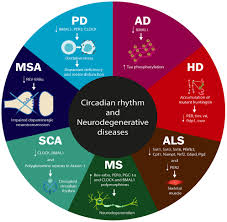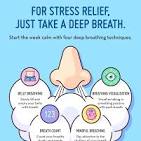The circadian rhythm is an internal clock that regulates the sleep-wake cycle, repeating roughly every 24 hours. This biological rhythm is influenced by external cues such as light and darkness, helping to synchronize our body’s functions with the natural day-night cycle.
Our circadian rhythm is controlled by a master clock located in the brain called the suprachiasmatic nucleus (SCN). This tiny region of the brain receives information about light levels from the eyes and sends signals to other parts of the body to regulate processes like hormone production, body temperature, and sleep patterns.
Disruptions to our circadian rhythm can have significant effects on our health and well-being. For example, jet lag occurs when we travel across multiple time zones, throwing off our internal clock and causing symptoms like fatigue, insomnia, and difficulty concentrating. Shift workers who have irregular work schedules may also experience disruptions to their circadian rhythm, leading to increased risk of health problems such as obesity, diabetes, and cardiovascular issues.
To maintain a healthy circadian rhythm, it’s important to establish consistent sleep-wake patterns by going to bed and waking up at the same time each day. Exposing yourself to natural light during the day and limiting exposure to artificial light at night can also help regulate your internal clock. Additionally, avoiding stimulants like caffeine close to bedtime and creating a relaxing bedtime routine can promote better sleep quality and support your circadian rhythm.
By understanding and respecting our circadian rhythm, we can optimize our health, energy levels, and overall well-being. Listening to our body’s natural cues and establishing healthy habits that support our internal clock can lead to improved sleep quality, mood stability, and overall vitality.
6 Benefits of Circadian Rhythms: Enhancing Sleep, Health, and Productivity
- Regulates the sleep-wake cycle for better quality sleep
- Helps synchronize our body’s functions with the natural day-night cycle
- Supports hormone production and regulation for overall health
- Aids in maintaining consistent energy levels throughout the day
- Contributes to improved mood stability and mental well-being
- Plays a role in optimizing cognitive performance and productivity
The Consequences of Circadian Rhythm Disruption: Sleep Disorders, Mood Changes, and Health Risks
- Disruption of circadian rhythm can lead to sleep disorders such as insomnia and hypersomnia.
- Irregular circadian rhythms may contribute to mood disorders like depression and anxiety.
- Shift work that disrupts the natural circadian cycle can increase the risk of metabolic disorders like obesity and diabetes.
- Jet lag, caused by rapid changes in time zones, can result in fatigue, irritability, and impaired cognitive function.
- Teenagers often experience a shift in their circadian rhythm, leading to delayed sleep patterns that may affect academic performance.
- Exposure to artificial light at night can suppress melatonin production, disrupting the body’s natural sleep-wake cycle.
- Chronic disruption of the circadian rhythm has been linked to an increased risk of certain cancers.
Regulates the sleep-wake cycle for better quality sleep
The circadian rhythm plays a crucial role in regulating the sleep-wake cycle, leading to better quality sleep. By aligning our internal clock with the natural day-night cycle, our body can optimize the timing of sleep and wakefulness, promoting restorative and deep sleep. This synchronization helps improve the overall quality of our sleep, enhancing factors such as mood, cognitive function, and physical health. When our circadian rhythm is properly balanced, we are more likely to experience consistent and rejuvenating sleep patterns that contribute to our overall well-being and vitality.
Helps synchronize our body’s functions with the natural day-night cycle
Synchronization of our body’s functions with the natural day-night cycle, facilitated by the circadian rhythm, is a crucial pro that supports overall health and well-being. By aligning our internal clock with external cues like light and darkness, our bodies can optimize processes such as hormone regulation, metabolism, and sleep patterns. This synchronization not only enhances our energy levels and cognitive function during the day but also promotes restful sleep at night. Maintaining a harmonious relationship between our biological rhythm and the external environment is essential for supporting a healthy lifestyle and ensuring that our body functions at its best throughout the day.
Supports hormone production and regulation for overall health
The circadian rhythm plays a crucial role in supporting hormone production and regulation for overall health. Our internal clock helps coordinate the release of hormones such as cortisol, melatonin, and growth hormone at optimal times throughout the day. Cortisol, known as the stress hormone, follows a natural rhythm with higher levels in the morning to promote alertness and lower levels at night to facilitate relaxation and sleep. Melatonin, the sleep hormone, is produced in response to darkness and helps regulate our sleep-wake cycle. By aligning our activities with our circadian rhythm, we can ensure proper hormone balance, which is essential for maintaining a healthy metabolism, immune function, mood stability, and overall well-being.
Aids in maintaining consistent energy levels throughout the day
The circadian rhythm plays a crucial role in aiding individuals to maintain consistent energy levels throughout the day. By regulating the sleep-wake cycle and coordinating various physiological processes, such as hormone production and body temperature, the circadian rhythm ensures that energy levels are optimized at different times of the day. This consistency in energy levels not only promotes alertness and productivity during waking hours but also supports overall well-being and vitality by preventing energy crashes and promoting a balanced distribution of energy reserves.
Contributes to improved mood stability and mental well-being
The circadian rhythm plays a crucial role in contributing to improved mood stability and mental well-being. By maintaining a consistent sleep-wake cycle aligned with our internal clock, we support the regulation of hormones and neurotransmitters that influence our mood and emotional state. When our circadian rhythm is disrupted, it can lead to mood swings, irritability, and even symptoms of depression or anxiety. Prioritizing healthy sleep habits and respecting our body’s natural rhythms can help stabilize our mood, enhance cognitive function, and promote overall mental well-being.
Plays a role in optimizing cognitive performance and productivity
The circadian rhythm plays a crucial role in optimizing cognitive performance and productivity. By aligning our activities with our internal clock, we can leverage peak periods of alertness and focus to tackle complex tasks, make decisions, and solve problems more effectively. Understanding and respecting our circadian rhythm allows us to schedule demanding cognitive work during times when our mental acuity is at its highest, leading to improved performance, increased productivity, and better outcomes in various aspects of our lives.
Disruption of circadian rhythm can lead to sleep disorders such as insomnia and hypersomnia.
Disruption of the circadian rhythm can have detrimental effects on our sleep patterns, potentially leading to sleep disorders like insomnia and hypersomnia. When our internal clock is thrown off balance due to factors like irregular sleep schedules, jet lag, or exposure to artificial light at night, it can result in difficulty falling asleep (insomnia) or excessive daytime sleepiness (hypersomnia). These disruptions not only impact the quantity of our sleep but also the quality, affecting our overall well-being and cognitive function. It is crucial to prioritize healthy sleep habits and maintain a consistent sleep-wake schedule to support a stable circadian rhythm and mitigate the risk of developing such sleep disorders.
Irregular circadian rhythms may contribute to mood disorders like depression and anxiety.
Irregular circadian rhythms, disrupted by factors like shift work, jet lag, or inconsistent sleep patterns, have been linked to mood disorders such as depression and anxiety. When our internal clock is out of sync with the natural day-night cycle, it can impact the regulation of hormones and neurotransmitters that play a crucial role in mood stability. This disruption may lead to symptoms of depression, including persistent sadness, loss of interest in activities, and feelings of hopelessness. Similarly, irregular circadian rhythms can exacerbate anxiety symptoms such as restlessness, irritability, and difficulty concentrating. By prioritizing consistent sleep-wake patterns and practices that support a healthy circadian rhythm, individuals may reduce their risk of developing or worsening mood disorders associated with circadian disruptions.
Shift work that disrupts the natural circadian cycle can increase the risk of metabolic disorders like obesity and diabetes.
Shift work that disrupts the natural circadian cycle can significantly increase the risk of metabolic disorders such as obesity and diabetes. When individuals are required to work irregular hours that conflict with their body’s internal clock, it can lead to disruptions in hormone regulation, appetite control, and energy metabolism. This misalignment between external work schedules and internal circadian rhythms can result in poor eating habits, decreased physical activity, and altered insulin sensitivity, all of which contribute to a higher likelihood of developing metabolic disorders over time. It is essential to recognize the impact of shift work on metabolic health and implement strategies to mitigate these risks through lifestyle modifications and supportive workplace policies.
Jet lag, caused by rapid changes in time zones, can result in fatigue, irritability, and impaired cognitive function.
Jet lag, a common con of disruptions to the circadian rhythm, is often experienced by travelers crossing multiple time zones quickly. This phenomenon can lead to symptoms such as fatigue, irritability, and impaired cognitive function. The body’s internal clock struggles to adjust to the new schedule, causing a mismatch between the external environment and our biological processes. As a result, individuals may find it challenging to stay alert, concentrate effectively, and regulate their mood during periods of jet lag. These temporary disruptions highlight the importance of maintaining a stable circadian rhythm for overall well-being and functioning.
Teenagers often experience a shift in their circadian rhythm, leading to delayed sleep patterns that may affect academic performance.
During adolescence, many teenagers undergo a natural shift in their circadian rhythm, resulting in delayed sleep patterns that make it difficult for them to fall asleep early and wake up early. This shift, often referred to as a “night owl” tendency, can have negative consequences on teenagers’ academic performance due to insufficient sleep. The mismatch between their internal clock and early school start times can lead to daytime sleepiness, difficulty concentrating, and reduced cognitive function, ultimately impacting their ability to learn effectively in the classroom. Addressing this con of circadian rhythm disruption in teenagers is crucial for promoting academic success and overall well-being during this developmental stage.
Exposure to artificial light at night can suppress melatonin production, disrupting the body’s natural sleep-wake cycle.
Exposure to artificial light at night can be a significant con of circadian rhythm disruption as it can suppress melatonin production, a hormone that plays a crucial role in regulating the body’s sleep-wake cycle. Melatonin is typically produced in response to darkness, signaling to the body that it’s time to sleep. However, exposure to artificial light, especially blue light emitted by electronic devices and energy-efficient lighting, can trick the brain into thinking it’s still daytime, inhibiting melatonin production and disrupting the natural sleep-wake cycle. This disruption can lead to difficulties falling asleep, poor sleep quality, and overall negative impacts on health and well-being. It is essential to minimize exposure to artificial light at night to support a healthy circadian rhythm and promote restful sleep.
Chronic disruption of the circadian rhythm has been linked to an increased risk of certain cancers.
Chronic disruption of the circadian rhythm has been identified as a concerning con, as it has been associated with an elevated risk of certain cancers. Studies have shown that individuals who experience prolonged disturbances in their sleep-wake cycle, such as those caused by shift work or frequent jet lag, may have a higher likelihood of developing cancer. The disruption of the body’s internal clock can lead to imbalances in hormone regulation and cellular processes, potentially contributing to the initiation and progression of cancerous growths. Therefore, prioritizing strategies to maintain a healthy circadian rhythm is crucial in reducing the risk of cancer and promoting overall well-being.




